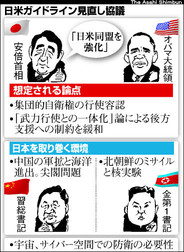 Source: www.asahi.com
Source: www.asahi.com As the panel has until December to come up with modified interpretations of the Constitution (particularly in relation to Article 9 and how this impacts upon Japan’s obligations to the region), expectations are that the Abe administration will use those interpretations as the basis for legislation to re-define the Self Defence Forces Act (particularly Article 90, which outlines the circumstances under which the SDF may respond to acts of provocation or an attack - J). As explained by the Daily Yomiuri (see the above English language link), such legislation may encounter resistance from the Cabinet Legislation Bureau (内閣法制局, or CLB), as the Bureau has stated in the past that ‘collective self defence’ is not sanctioned by the Constitution (as former SDP leader Fukushima Mizuho outlined in this question on notice to the House of Councillors – J).
PM Abe has in part sought to mollify the CLB’s thinking by appointing former diplomat Komatsu Ichirō as head of the CLB. Komatsu himself has said that the Bureau will examine a re-interpretation of the Constitution and Article 9 based on the report by the advisory panel, and that under international law, collective self defence is not an unusual concept and is in keeping with the idea of group protection (J). Abe might not, however, have an easy time convincing the Supreme Court to adopt this position, given that former CLB head and current Supreme Court Judge Yamamoto Tsuneyuki supported the view that collective self defence is not compatible with the Constitution, which may have been a contributing factor in his removal from his former position (J). Yet considering the fact that the Diet has all but ignored previous rulings by the Supreme Court on electoral district vote weightings, objections from the Supreme Court will probably not have a great deal of influence on this matter.
Central right politicians in Japan have been in favour of Japan at least agreeing to examine the possibility of collective self defence, given that this concept is itself sanctioned under international law. According to Article 51 of the Charter of the United Nations [1945]…”Nothing in the present Charter shall impair the inherent right of individual or collective self-defense if an armed attack occurs against a Member of the United Nations, until the Security Council has taken the measures necessary to maintain international peace and security” (Donald R Rothwell et.al, International Law: Cases and Materials with Australian Perspectives, Cambridge University Press, Melbourne, 2011, p.626). This definition has been seized on by prominent LDP politicians such as Ishiba Shigeru to lend weight to their argument that if Japan expects its allies (or more accurately, ally) to come to its aid should be attacked by a hostile power, Japan must first demonstrate that it too has the resolve to protect its allies and contribute in an active manner to maintaining the peace and security of the region (石破茂、国難 政治に妄想はいらない、新潮社、2011年、p.101-102).
It is certainly not outside of the realms of possibility that many of the states within the Asia-Pacific would see any move by Japan to assert itself militarily as evidence that Japan is again embarking upon a path towards militarism, and that Japanese involvement in military operations would make a mockery of its constitutional position on the use of force. Yet one could also argue that as Japan realises that the regional dynamic has shifted in favour of a state that harbours hostility towards Japan, it is no longer viable for Japan to remain neutral on issues of regional security when its own interests hinge upon receiving assistance from other states that exercise collective self-defence.
As PM Abe has indicated that he wishes to form closer defence ties with ‘like-minded’ states within the region, for Japan to remain neutral or contribute in limited ways to regional security initiatives would undermine Japan’s status as a regional power. Unlike other prominent ‘neutral’ states such as India, Japan does not possess either the population nor military arsenal to act as a deterrent to hostile states (or more correctly, large scale military powers), and thus relies on its alliance with the US for the ‘deterrent’ that a nuclear superpower can provide. Yet if Japan were to remain idle while the US and other pro-US states become involved in a dispute within the Asia-Pacific region, Japan’s value as an ally would come under question, leading to the possibility of strategic isolation (which would in turn require Japan to make significant investments in its defence forces for its own benefit, including nuclear weapons, which would further complicate an already dire situation).
Still, don’t expect to see this particular issue being pursued with any form of vigour for the next few months as both parties within the ruling Coalition work through their various stances on collective self defence. While Satō Shigeki of the New Komeitō has expressed the need for Constitutional revision to bring this about, LDP Chief Secretary Ishiba Shigeru (mentioned above) as said no such modifications are necessary, and all that what remains is for the meaning of the Constitution to be re-interpreted. As the Tokyo Shimbun has reported (J), the entire question of what collective self defence means has yet to be played out within political advisory groups let alone the general Japanese public, hence it may be some time before any sign of a conclusion to the issue is reached.
 RSS Feed
RSS Feed